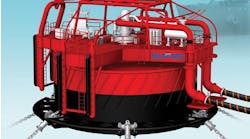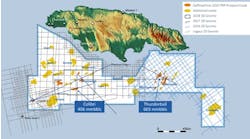Offshore staff
ABERDEEN, UK – Oil and Gas UK (OGUK) has launched a survey designed to identify problems companies in the UK supply chain are facing in the current crisis.
Questions cover offshore activity levels, companies’ financial positions, employment levels and plans, and seeks feedback on steps that could be taken by industry and government to support the sector.
Surveys have gone out to hundreds of OGUK supply chain member companies ranging from larger contractors to small- and medium-sized enterprises.
The results will inform the details of a COVID 19 Sectoral Resilience Package the industry will put together and propose to governments over the coming weeks. It will build upon the support already offered by government to UK companies and self-employed workers.
One of the issues it will address is the ‘stranded middle’: companies currently not eligible to apply for the UK’s Coronavirus Business Interruption Loan (CBIL) Scheme or the COVID-19 Corporate Financing Facility (CCFF).
Last night, the UK government announced the introduction of a Coronavirus Large Business Interruption Loan Scheme (CLBILS), under which the government will provide a guarantee of 80% to enable banks to make loans of up to £25 million ($30.62 million) to firms with an annual turnover of between £45 million and £500 million ($55.11 to $612 million).
OGUK Supply Chain Director Matt Abraham said: “Our supply chain is facing pressures in the extreme. The operational impact of the coronavirus pandemic, low oil and gas demand, and low prices mean an uncertain future for many.
“This triple whammy of concern comes only as many were just starting to emerge from the impact of the previous prolonged downturn. Last night’s announcement from government is welcome and confirms it is listening and responding to feedback, however, there are still specific issues with regards to support for the oil and gas sector which OGUK is working to address with both UK and Scottish governments.
“We’re hoping this survey will give us a clear idea of where governments and regulators can offer specific help that will really make a difference and we’re urging all of our members in the supply chain to take part.”
Abraham thanked the Confederation of British Industries (CBI) for helping to develop proposals.
Speaking during a briefing yesterday, Abraham said the survey should provide insight into how many OGUK members have applied for financial help. He pointed out that a large number of oilfield service companies, equipment manufacturers and suppliers, and contractors operating on the UK continental shelf have a turnover of more than £45 million - possibly 40-50% of the members.
OGUK has also formed a Logistics Group to deal with the problems of sustaining normal operations as the COVID-19 virus spreads. The association’s HSE director Trevor Stapleton said this is presently focused on three main issues: transportation of offshore personnel, moving oilfield goods and equipment around the UK, and how to remove contaminated bed linen from offshore facilities.
Abraham said one of the major concerns has been challenges by the police concerning long-distance transportation/road journeys, due to government restrictions on UK travel. “We have been working with the police on how to move people [and permitted equipment] around, and have come up with a method that we think will work.”
In addition, the association has been collaborating with its members on INEOS’ decision last week to defer this summer’s planned shutdown of the Forties Pipeline System in the UK central North Sea which handled production from numerous fields in the area; and on other elements of offshore facility turnarounds that had been planned for later in the year.
At the same time, Abraham continued, the association is looking to the longer term, planning for the future and what happens when the UK industry emerges from what he described as “this horrible event.”
04/03/2020



